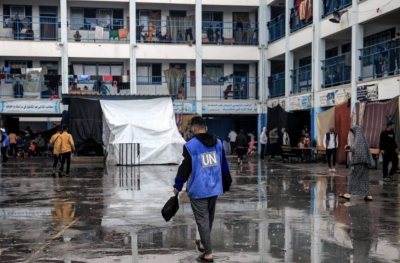
A man walks past a poster of Palestinian Authority President Mahmoud Abbas in the Shatila Palestinian refugee camp in Beirut. Feb. 7, 2024. (Credit: João Sousa/L'Orient Today)
SHATILA CAMP, Beirut — Amid talk of a possible Gaza ceasefire in the coming days, Palestinians watching from afar in Lebanon are questioning what role might go to the Palestinian Authority, which governs the West Bank and could — some sides propose — administer Gaza once the dust settles.
Gaza is currently governed by Hamas, which launched the surprise Operation al-Aqsa Flood on Oct. 7 against Israel by land, air and sea, killing 1,200 Israelis and capturing more than 240 hostages.
Israel has, since then, responded by bombarding Gaza relentlessly, killing nearly 28,000 Palestinians and injuring more than 67,000, according to Gaza’s health ministry.
Five months into the carnage, Hamas has proposed — with Qatari mediation — a ceasefire of four and a half months, during which all Israeli hostages would go free, Israel would withdraw its troops from Gaza and an agreement would be reached on an end to the war.
Meanwhile, the US is reportedly pushing for the Palestinian Authority (PA) to take over governance of Gaza after the war.
In Beirut’s Shatila Palestinian refugee camp, home to more than 14,010 people, the response to the idea is not one of excitement. Twenty-something graphic designer Mahmoud Abu al-Shoq tells L’Orient Today that he considers the PA “non-existent.”
“They are not even officially on the negotiating table trying to push for a ceasefire, and we, the Palestinians of the diaspora, are left to fend for ourselves in camps across the Middle East.”
 A poster of Hamas military spokesperson Abu Obeida in the Shatila Palestinian refugee camp in Beirut. Feb. 7, 2024. (Credit: João Sousa/L'Orient Today)
A poster of Hamas military spokesperson Abu Obeida in the Shatila Palestinian refugee camp in Beirut. Feb. 7, 2024. (Credit: João Sousa/L'Orient Today)
The Shatila camp is informally run by the Palestinian Fatah party of which PA President Mahmoud Abbas is the leader.
There, in tight alleyways, photos of killed Gazan children, fighters, Abbas, and even Abu Obeida, Hamas’s armed wing's official spokesperson, adorn the doors of cafes, homes and shops.
Pressing the “mute” button on her minimarket TV in the camp, Palestinian refugee Dalal Ali Ahmad, originally from Safad in Palestine, tells L’Orient Today she has been “chronically depressed since the assault on Gaza. Does the Palestinian Authority not have a television?”
“Do they not see what’s happening? How do they [the PA] still have their hands in the hands of the Israelis?” she asks, expressing disappointment over decades of security coordination between the PA and Israeli authorities.
Under the 1993 and 1995 Oslo Accords, the PA is required to share intelligence with Israel as part of its highly criticized policy of “security coordination” and to help thwart armed resistance by Palestinians, including by helping with arrests.
“The PA, along with Arab leaders, need to unite with each other to end this genocide, instead of coordinating with Israel,” Ahmad says.
A shopper steps into her minimarket and says simply, “the PA and Israel are one,” before leaving the shop, carrying water bottles, bags of chips and a pack of cigarettes.
A new governing body for Gaza?
The post-ceasefire plan, mainly pushed by the US, appears to be one that would allow the PA to govern Gaza, “in the same way that it governs the West Bank, mainly through what is referred to as a security coordination with Israel,” Mohanad Hage Ali, a researcher at Beirut’s Malcolm H. Kerr Carnegie Middle East Center, tells L’Orient Today.
 A woman walks past a poster of Hamas military spokesperson Abu Obeida in the Shatila Palestinian refugee camp in Beirut. Feb. 7, 2024. (Credit: João Sousa/L'Orient Today)
A woman walks past a poster of Hamas military spokesperson Abu Obeida in the Shatila Palestinian refugee camp in Beirut. Feb. 7, 2024. (Credit: João Sousa/L'Orient Today)
 Shatila residents gather in a street in the camp. Feb. 7, 2024. (Credit: João Sousa/L'Orient Today)
Shatila residents gather in a street in the camp. Feb. 7, 2024. (Credit: João Sousa/L'Orient Today)
However, he adds, the PA does not yet have an official role in Gaza and is not officially involved in ceasefire negotiations as it is not engaging in an armed battle against Israeli forces.
That has been the case since the 1990s, when the Fatah-led Palestine Liberation Organization (PLO) officially renounced armed resistance and then the PLO signed the Oslo Accords, which led to the creation of the PA.
“Israel is trying to push back against any Hamas staying in the strip after the end of conflict, so they want to rule Gaza like the West Bank, with a new approach, and redefine the distribution of power by forming a new Palestinian government,” Hage Ali says. “This has been very clear from the negotiations.”
But to Palestinians themselves, Mahmoud Abbas’ PA government is “a controversial one,” because its “security apparatus hands resistance fighters in the West Bank to Israel.”
Abbas is accused by Palestinians of having helped Israel maintain its governance over the occupied West Bank since his rise to leadership in 2005, abandoning armed resistance. PA security forces also foil attacks by Palestinian factions in the West Bank against Israel.
 Graphic designer Mahmoud Abu al-Shoq poses in the Shatila Palestinian refugee camp in Beirut. Feb. 7, 2024. (Credit: João Sousa/L'Orient Today)
Graphic designer Mahmoud Abu al-Shoq poses in the Shatila Palestinian refugee camp in Beirut. Feb. 7, 2024. (Credit: João Sousa/L'Orient Today)
The PA, led by the Fatah party, generally seeks a two-state solution through negotiation. On the other hand, Hamas, which controls the Gaza Strip, does not recognize Israel's right to exist and has been involved in armed conflict with Israel.
The PA’s head in Lebanon did not respond to several requests for comment.
A Hamas leader in Lebanon, speaking on condition of anonymity, told L’Orient Today that “to us, the war has just started and God willing we will not allow Israel and its allies [referring to the PA] to turn Gaza into another Israeli settlement.”
More pressing matters at hand?
In the meantime, the funding of the UN's aid agency for Palestinian refugees in the region (UNRWA), has been threatened when Israel claimed that a dozen UNRWA staff were involved in the Oct. 7 operation.
According to the Lebanon director of UNRWA, Dorothee Klaus, UNRWA's work in Lebanon could end by March.
Ali Hweidi, a Palestinian refugee in Lebanon and the London-based Palestine Return Centre’s representative in Lebanon tells L’Orient Today that “the timing of the [PA] issue is not right, with all due respect. Currently, the focus is more on the UNRWA issue.”
Residents in Shatila are similarly dismissive.
“In the end, I only believe in armed resistance against Israel, the PA and all its accords mean nothing to me,” says graphic designer Abu al-Shoq, taking a drag from his cigarette.
 A poster of Hamas military spokesperson Abu Obeida in the Shatila Palestinian refugee camp in Beirut. Feb. 7, 2024. (Credit: João Sousa/L'Orient Today)
A poster of Hamas military spokesperson Abu Obeida in the Shatila Palestinian refugee camp in Beirut. Feb. 7, 2024. (Credit: João Sousa/L'Orient Today)
“I’m waiting for the borders between Lebanon and Palestine to open so I can go and fight for my homeland, and maybe one day I can go and sit on the beach of my hometown Yaffa, instead of in Shatila.”
Mohammad Sayed Issa, in his mid-20s, owns a small truck where he sells fruits and vegetables. “I only ask the PA to help open the border and help us return to Palestine…because here in Lebanon we are not living,” he says.
Issa’s childhood friend, Mohammad Abdel Rahman, adds: “If there was an actual Sulta [PA] they would have implemented a coup within the West Bank against Israel …When they saw the atrocities that were happening within Gaza.”
“But Palestine doesn’t have a president. To me Mahmoud Abbas is non-existent.”


